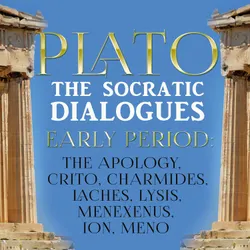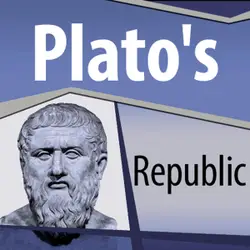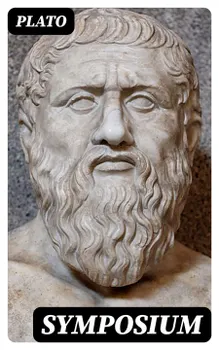In the renowned work 'Symposium', Plato presents a series of philosophical dialogues centered around the theme of love, known as Eros. Set during a banquet, the text unfolds as various prominent figures, including Socrates, engage in a series of speeches that explore different dimensions of love—from the physical to the divine. This dialogue not only reflects Plato's characteristic blend of rhetorical skill and philosophical inquiry but also situates itself within the context of classical Greek thought, encapsulating the tensions and aspirations of Athenian society in the 4th century BC. The literary style is infused with irony and allegory, challenging readers to ponder the complexities of desire and the nature of beauty itself. Plato, a student of Socrates and a pivotal figure in Western philosophy, sought to understand the essence of human existence and the ideal forms of reality. His philosophical inquiries were deeply influenced by his experiences in the tumultuous political landscape of Athens and the Socratic method of questioning that shaped his intellectual pursuits. These influences are evident in 'Symposium', where he crafts a compelling narrative that invites listeners to reconsider the roles of love and intellect within their lives. 'ymposium' is essential for anyone seeking to delve into the philosophical foundations of Western thought. It presents a rich tapestry of ideas that challenge contemporary notions of love and relationships. The text is not only a cornerstone of philosophical literature but also an enduring masterpiece that resonates with the timeless quest for understanding the human condition.

50 Timeless Masterpieces (Volume 1) : Essential Classics for a Rich Literary Journey
Homer, Sun Tzu, Plato, Dante, Shakespeare, Miguel de Cervantes, John Milton, Daniel Defoe, Johann Wolfgang von Goethe, Jane Austen, Nikolai Gogol, Emily Brontë, Mary Shelley, Alexandre Dumas, Fyodor Dostoevsky, Charles Dickens, Victor Hugo, Nathaniel Hawthorne, Gustave Flaubert, Leo Tolstoy, Henrik Ibsen, Herman Melville, Mark Twain, Robert Louis Stevenson, Arthur Conan Doyle, Raymond Chandler, H. G. Wells, Joseph Conrad, Rudyard Kipling, Louisa May Alcott, L. Frank Baum, L. M. Montgomery, T. S. Eliot, Franz Kafka, James Joyce, Virginia Woolf, C. S. Lewis, Ernest Hemingway, Walt Whitman, Jack Kerouac, John Steinbeck, William Faulkner, Kate Chopin, Zora Neale Hurston, Margaret Mitchell, Sylvia Plath, Thomas Mann, Albert Camus, George Orwell
book
90 Masterpieces You Must Read (Vol.1) : Novels, Poetry, Plays, Short Stories, Essays, Psychology & Philosophy: The Madman, Moby-Dick, Siddhartha, Crime and Punishment, Hamlet, Great Expectations, Little Women, Meditations, The Einstein Theory, Heart of Darkness, The Red Badge of Courage
Walt Whitman, Herman Hesse, George Eliot, Kahlil Gibran, Anton Chekhov, Herman Melville, Oscar Wilde, Fyodor Dostoevsky, Nikolai Gogol, James Joyce, Henry David Thoreau, William Shakespeare, T. S. Eliot, John Keats, Charles Baudelaire, Walter Scott, Daniel Defoe, Louisa May Alcott, Jane Austen, Charlotte Brontë, Emily Brontë, Anne Brontë, Leo Tolstoy, Benito Pérez Galdós, William Makepeace Thackeray, Pierre Choderlos de Laclos, R.D. Blackmore, Alexandre Dumas, Marcel Proust, D. H. Lawrence, Charles Dickens, Thomas Hardy, Henry James, Guy de Maupassant, Princess Der Ling, Victor Hugo, Juan Valera, Anthony Trollope, Stephen Crane, E. M. Forster, Theodore Dreiser, Margaret Cavendish, Upton Sinclair, Plato, Apuleius, Marcus Aurelius, Sun Tzu, Voltaire, Miguel de Cervantes, Giovanni Boccaccio, Frederick Douglass, Sigmund Freud, H. A. Lorentz, Wallace D. Wattles, James Allen, Agatha Christie, Arthur Conan Doyle, Joseph Conrad, H. P. Lovecraft, Washington Irving, Mary Shelley, H. G. Wells, Edgar Allan Poe, Ernest Hemingway, L. Frank Baum, Robert Louis Stevenson, Mark Twain, Selma Lagerlöf, Jack London, Jules Verne, Lewis Carroll, Frances Hodgson Burnett, Rudyard Kipling, George Bernard Shaw, Soseki Natsume, Johann Wolfgang Goethe, Edgar Rice Burroughs, Brothers Grimm, Hans Christian Andersen
book
The Complete Harvard Classics - All 51 Volumes in One Edition : The Anthology of the Greatest Works of World Literature - Dr. Eliot's Five Foot Shelf
Plato, Marcus Aurelius, William Shakespeare, Benjamin Franklin, Homer, Friedrich von Schiller, William Makepeace Thackeray, John Ruskin, Robert Louis Stevenson, Edgar Alan Poe, Henry David Thoreau, Voltaire, Jean Jacques Rousseau, Immanuel Kant, Thomas Hobbes, John Woolman, William Penn, Epictetus, Francis Bacon, John Milton, Thomas Browne, Ralph Waldo Emerson, Robert Burns, Saint Augustine, Thomas à Kempis, Aeschylus, Sophocles, Euripides, Aristophanes, Marcus Tullius Cicero, Pliny the Younger, Adam Smith, Charles Darwin, Plutarch, Virgil, Miguel de Cervantes, John Bunyan, Izaak Walton, Aesop, Wilhelm Grimm, Jacob Grimm, Hans Christian Andersen, John Dryden, Richard Brinsley Sheridan, David Garrick, Oliver Goldsmith, Percy Bysshe Shelley, Robert Browning, George Gordon Byron, Johann Wolfgang von Goethe, Christopher Marlowe, Dante Alighieri, Alessandro Manzoni, Richard Henry Dana, Edmund Burke, John Stuart Mill, Thomas Carlyle, Pedro Calderón de la Barca, Pierre Corneille, Jean Racine, Molière, Gotthold Ephraim Lessing, Philip Sidney, Ben Jonson, Abraham Cowley, Joseph Addison, Richard Steele, Jonathan Swift, Daniel Defoe, Samuel Johnson, David Hume, Sydney Smith, Samuel Taylor Coleridge, William Hazlitt, Leigh Hunt, Charles Lamb, Thomas De Quincey, Thomas Babington Macaulay, James Russell Lowell, Michael Faraday, Hermann Ludwig Ferdinand von Helmholtz, Simon Newcomb, Archibald Geikie, Benvenuto Cellini, Michel de Montaigne, Charles Augustin Sainte-Beuve, Ernest Renan, Giuseppe Mazzini, Herodotus, Tacitus, Francis Drake, Philip Nichols, Francis Pretty, Walter Bigges, Edward Haies, Walter Raleigh, René Descartes, Jean Froissart, Thomas Malory, William Henry Harrison, Niccolo Machiavelli, William Roper, Thomas More, Martin Luther, John Locke, George Berkeley, Hippocrates, Ambroise Paré, William Harvey, Oliver Wendell Holmes, Joseph Lister, Louis Pasteur, Thomas Dekker, Francis Beaumont, John Fletcher, John Webster, Philip Massinger, Blaise Pascal, William A. Neilson
book
The Masterpieces of World Literature : 150 Books You Should Read Before You Die: Romeo and Juliet, Emma, Vanity Fair, Middlemarch, Tom Sawyer, Faust, Notre Dame de Paris, Dubliners, Odyssey
William Shakespeare, John Milton, Jonathan Swift, Daniel Defoe, Henry Fielding, Laurence Sterne, Jane Austen, William Makepeace Thackeray, P. B. Shelley, Mary Shelley, John Keats, Charlotte Brontë, Emily Brontë, Anne Brontë, George Eliot, Charles Dickens, Thomas Hardy, Elizabeth von Arnim, D. H. Lawrence, Ann Ward Radcliffe, Bram Stoker, Arthur Conan Doyle, Joseph Conrad, Oscar Wilde, Lewis Carroll, Frances Hodgson Burnett, C. S. Lewis, George Weedon Grossmith, H. G. Wells, Willkie Collins, G. K. Chesterton, E. M. Forster, T. S. Eliot, James Joyce, George Bernard Shaw, W. B. Yeats, Sir Walter Scott, Robert Louis Stevenson, Kenneth Grahame, George MacDonald, J. M. Barrie, Mark Twain, Jack London, Herman Melville, Nathaniel Hawthorne, Louisa May Alcott, Willa Cather, Edith Wharton, Kate Chopin, Henry David Thoreau, Walt Whitman, Kahlil Gibran, Harriet Beecher Stowe, Frederick Douglass, James Fenimore Cooper, Henry James, Edgar Allan Poe, H. P. Lovecraft, Lewis Wallace, L. M. Montgomery, Homer, Apuleius, Marcus Aurelius, Johann Wolfgang von Goethe, Herman Hesse, Friedrich Nietzsche, Jules Verne, Marcel Proust, Victor Hugo, Gustave Flaubert, Gaston Leroux, Honoré de Balzac, Stendhal, Plato
book
Library of Masterpieces - 100 Books to Read in a Lifetime
illiam Shakespeare, Fyodor Dostoevsky, Louisa May Alcott, Miguel de Cervantes, John Milton, Jane Austen, Charlotte Brontë, Emily Brontë, Anne Brontë, William Makepeace Thackeray, George Eliot, Charles Dickens, Thomas Hardy, Jonathan Swift, Daniel Defoe, Joseph Conrad, Robert Louis Stevenson, Mary Shelley, Bram Stoker, Arthur Conan Doyle, Wilkie Collins, Oscar Wilde, T. S. Eliot, D. H. Lawrence, James Joyce, Virginia Woolf, E. M. Forster, Evelyn Waugh, Aldous Huxley, George Orwell, H. G. Wells, Lewis Carroll, Frances Hodgson Burnett, Kenneth Grahame, C. S. Lewis, Malcolm Lowry, Ford Madox Ford, Mark Twain, Jack London, Herman Melville, Ernest Hemingway, Jack Kerouac, Nathaniel Hawthorne, Edith Wharton, Walt Whitman, Kate Chopin, Harriet Beecher Stowe, Neale Hurston, Richard Wright, Raymond Chandler, Dashiell Hammett, F. Scott Fitzgerald, John Steinbeck, William Faulkner, Margaret Mitchell, Sylvia Plath, Carson McCullers, L. Frank Baum, L. M. Montgomery, Leo Tolstoy, Ivan Turgenev, Nikolai Gogol, Johann Wolfgang von Goethe, Friedrich Nietzsche, Thomas Mann, Franz Kafka, Erich Maria Remarque, Albert Camus, Marcel Proust, Jules Verne, Victor Hugo, Gustave Flaubert, Stendhal, Alexandre Dumas, Henrik Ibsen, Rudyard Kipling, Homer, Sophocles, Virgil, Laozi, Sun Tzu, Plato, Marcus Aurelius, Dante Alighieri, Niccolò Machiavelli
book
180 Masterpieces You Should Read Before You Die (Vol.1) : Leaves of Grass, Siddhartha, Middlemarch, The Jungle, Macbeth, Moby-Dick, A Study in Scarlet, The Call of the Wild, Huckleberry Finn,, The Way We Live Now, Sister Carrie...
Walt Whitman, George Eliot, Herman Hesse, Kahlil Gibran, Anton Chekhov, Herman Melville, Oscar Wilde, Fyodor Dostoevsky, William Shakespeare, Mark Twain, Marcus Aurelius, Nikolai Gogol, James Joyce, Henry David Thoreau, T. S. Eliot, John Keats, Charles Baudelaire, Walter Scott, Daniel Defoe, Louisa May Alcott, Jane Austen, Charlotte Brontë, Emily Brontë, Anne Brontë, Leo Tolstoy, Victor Hugo, Jules Verne, Lewis Carroll, Frances Hodgson Burnett, Brothers Grimm, Hans Christian Andersen, Agatha Christie, Wallace D. Wattles, James Allen, Sigmund Freud, Miguel de Cervantes, Frederick Douglass, Voltaire, Sun Tzu, Plato, Upton Sinclair, Anthony Trollope, E. M. Forster, Theodore Dreiser, Charles Dickens, Thomas Hardy, Henry James, D. H. Lawrence, William Makepeace Thackeray, Marcel Proust, H. G. Wells, Edgar Allan Poe, Ernest Hemingway
book
The Republic
Plato
audiobookbook
Yale Required Reading - Collected Works (Vol. 1)
Herodotus, Sappho, Homer, Hesiod, Alcaeus, Archilochus, Anacreon, Theognis of Megara, Simonides of Ceos, Bacchylides, Pindar, Aeschylus, Sophocles, Euripides, Aristophanes, Thucydides, Plato, Aristotle, Lysias, Demosthenes, Apollonius, Callimachus, Theocritus, Plutarch, Epictetus, Gilbert Murray
book
The Socratic Dialogues. Early Period : The Apology, Crito, Charmides, Laches, Lysis, Menexenus, Ion, Meno
Plato
audiobook
10 Masterpieces You Have To Listen To Before You Die: Vol. 1
Lewis Carroll, Joseph Conrad, Miguel de Cervantes, F. Scott Fitzgerald, Edgar Allan Poe, Franz Kafka, Jack London, Sun Tzu, H.G. Wells, Plato
audiobook
Plato's Republic
Plato
audiobookbook
Plato's Republic
Plato
book
